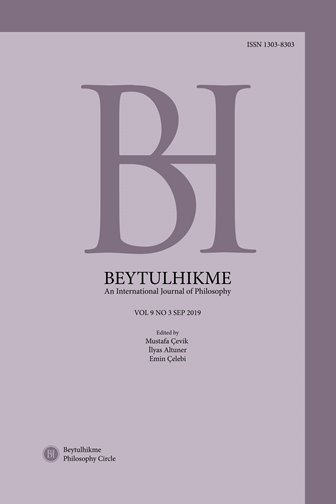Author :
Abstract
Varoluşçuluk terimi genellikle özden ziyade varoluşun ve evrensel olan karşısında da bireysel olanın ön plana çıkarıldığı bir düşünce akımı olarak değerlendirilir. Bu bağlamda birçok felsefe tarihçisi, somut insana ve bireye yaptığı vurgu sebebiyle Friedrich Nietzsche’yi varoluşçuluk akımının önemli köşe taşlarından birisi olarak yorumlar. Diğer taraftan Nietzsche’nin felsefe külliyatı, varoluşçuluk düşüncesi ile bağdaşmayan çok sayıda kavrama sahiptir. Bu çalışma Nietzsche’nin felsefi projesinin ne ölçüde varoluşçuluk akımı ile uyuştuğunu nihilizm, üst insan, güç istemi ve ebedi dönüş gibi kavramlardan hareketle tartışmaya açmakta ve en nihayetinde Nietzsche’nin bir varoluşçu olarak değerlendirilemeyeceği sonucuna ulaşmaktadır.
Keywords
Abstract
The term existentialism is generally conceived as an intellectual movement that values existence rather than essence and individuality over universality. In this context, many historians of philosophy regard Friedrich Nietzsche as one of the cornerstones of the existentialist movement, for his emphasis is on the individual and concrete human. On the other side, Nietzsche’s philosophical corpus contains many notions which cannot be reconciled with the thought of existentialism. Based on concepts like nihilism, Overman, will to power and eternal recurrence the article discusses to what extent Nietzsche’s philosophical project aligns itself with the existentialist movement and as a conclusion, it defends that Nietzsche cannot be regarded as an existentialist.
Keywords
- Blackham, H. J. (2002). Six Existentialist Thinkers. London: Routledge.
- Camus, A. (1988). Sisyphos Söyleni. (Çev. T. Yücel). İstanbul: Adam Yayınları.
- Kaufmann, W. (1956). Existentialism: From Dostoyevsky to Sartre. New York: Meri- dian Books.
- Nietzsche, F. (1999). Kritische Studienausgabe. (Hrsg. G. Colli & M. Montinari). München: Deutscher Taschenbuch Verlag de Gruyter GmbH & Co. -(FW) Die fröhliche Wissenschaft (Şen Bilim) -(GD) Götzen-Dämmerung (Putların Alacakaranlığı) -(GM) Zur Genealogie der Moral (Ahlakın Soykütüğü) -(JGB) Jenseits von Gut und Böse (İyinin ve Kötünün Ötesinde) -(N) Nachlass (Basılmamış El yazmaları) -(WL) Über Wahrheit und Lüge im Aussermoralischen Sinne (Ahlaki Olmayan Anlamda Hakikat ve Yalan Üzerine). -(Z) Also sprach Zarathustra (Böyle Söyledi Zerdüşt)
- Plato (1997). Phaedo. Plato: Complete Works. (Ed. J. M. Cooper, trans. G. M. A. Grube). Indianapolis: Hackett Publishing Co.
- Sartre, J.-P. (2005). Varoluşçuluk. (Çev. A. Bezirci). İstanbul: Say Yayınları.
- Sartre, J.-P. (2010). Varlık ve Hiçlik. (Çev. T. Ilgaz & G. Çankaya Eksen). İstanbul: İthaki Yayınları.
- Solomon, R. C. (2003). Living with Nietzsche. Oxford: Oxford University Press.
